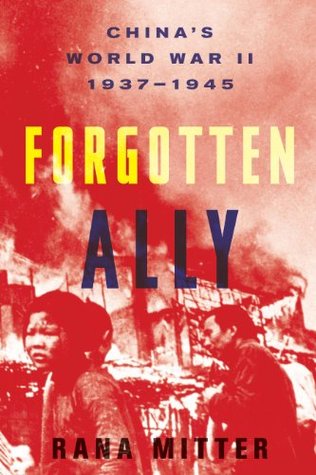More on this book
Community
Kindle Notes & Highlights
by
Rana Mitter
Read between
September 22 - September 22, 2019
was seeking to resist a major Japanese incursion with reduced troops at the same time that he had been pressured to support a campaign in Burma of which he did not approve. Simultaneously, his rule was also being undermined by American attempts to find other bases of power.
Mao would never genuinely entertain an alliance with Washington.53 His ideological alignments were toward Stalin and toward a radical, violent, indigenous revolution.
The years of isolation, and the acceptance of an alliance that placed China far down the list of Allied priorities, put Chiang in an impossible position.
Gauss was no admirer of Chiang, but he could see that the CCP was not the magic key that could transform the worsening war situation in China.
The relationship between America and China had now become poisoned almost beyond recognition.
The bad blood between Chiang Kai-shek and Joseph Stilwell was the most colorful and ultimately the most public face of Sino-American discord during the wartime alliance.
but it should not distract attention from the wider strategic decision that Marshall and the other Allied leaders had made at the start of the war: China was not going to be a major theater of war in the Allied effort.
The seeds were sown for mistrust between the US and China that would continue after the eventual Communist victory in 1949. Even today, the state of US-China relations shows that those wounds are a long way from being healed.
Nonetheless, the relationship of the United States with Chiang Kai-shek’s government had now reached a new low.
Chiang was still persuaded that the US wanted to raise China’s status in the world, whereas the British had no intention of taking the country seriously in any postwar settlement.
Roosevelt had ceded to Stalin a restoration of the rights in East Asia that Russia had lost after the 1904–1905 Russo-Japanese War. But Roosevelt secured an assurance that the USSR would not actively support the Communists against the Nationalists. Roosevelt told Chiang about this condition, but Stalin did not tell Mao.32 The Communist leader was unaware of Stalin’s betrayal.
In August 1945 China was simultaneously in the strongest global position it had ever occupied and weaker than it had been for nearly a century. When the war began, it had still been subject to extraterritoriality and imperialism. Now, not only had the much-hated system of legal immunity for foreigners ended, but China
was about to make its mark on the postwar world.
The relationship with the US had become bitter, poisoned by the Stilwell fiasco.
And what seemed deeply ironic was that a triumphant Mao Zedong might now reap the fruits of Chiang Kai-shek’s victory.
“The Chinese, talking about communism, are talking about a tiger’s face and skin! Why? Because the CCP sets fires and kills people, and in everything its talents are for destruction:”
(although it was a country that had never really been the Americans’ to lose in the first place)
The international message was clear: the Second World War had been won by four, not three great Allies.
Without Chinese resistance, China would have become a Japanese colony as early as 1938. This would have allowed Japan dominance over the mainland, and would have allowed Tokyo to turn its attention to expansion in Southeast Asia even more swiftly, and with less distraction. A pacified China would also have made the invasion of British India much more plausible. Without the “China Quagmire”—a quagmire caused by the refusal of the Chinese to stop fighting—Japan’s imperial ambitions would have been much easier to fulfill.
Jung Chang and Jon Halliday’s Mao: The Unknown Story (London, 2006) provides a great deal of new detail, and assesses Mao in ultimately negative terms. Philip Short, Mao: A Life (London, 2001), and Alexander Pantsov and Steven Levine, Mao: The Real Story (New York, 2012), suggest that Mao both made important contributions to the revolution and committed terrible crimes. A fine guide to the controversies over Mao is Timothy Cheek, ed., A Critical Introduction to Mao (Cambridge, 2010).


